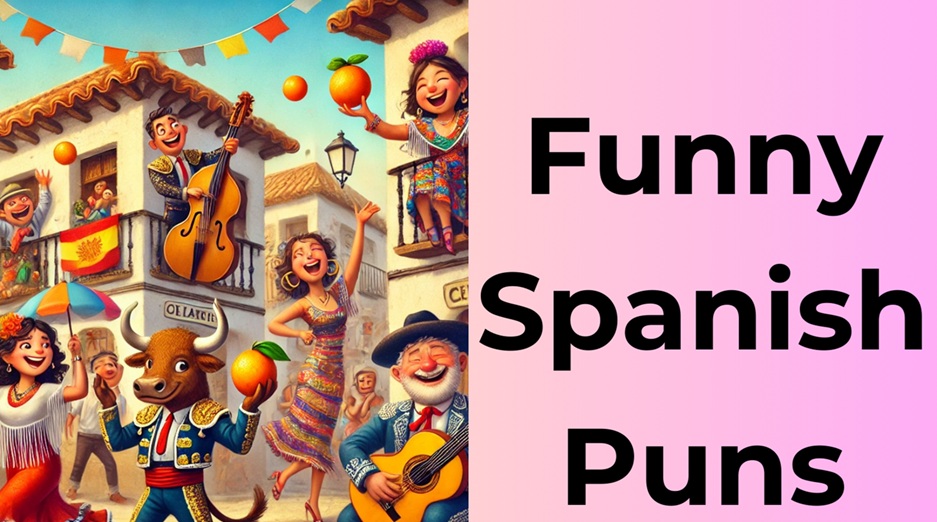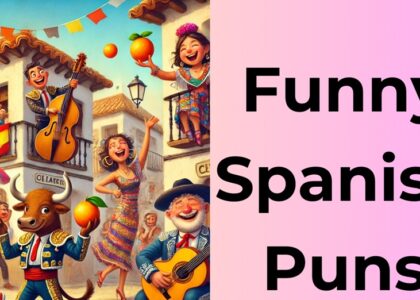Wordplay is a universal joy, but when you add the richness of the Spanish language to the mix, it becomes an even more delightful experience. Whether you’re a native Spanish speaker, a bilingual enthusiast, or just someone who loves clever puns, this article is your ultimate guide to 115+ Spanish puns that will leave you laughing and marveling at the beauty of language. From food puns to cultural references, we’ve got it all covered. So buckle up and get ready for some linguistic fun!
Table of Contents
Why Are Puns So Universally Loved?
Puns are a form of humor that relies on the clever use of words with multiple meanings or similar sounds. They’re often described as “the lowest form of wit,” but don’t let that fool you—puns are actually a testament to the creativity and flexibility of language. In Spanish, puns take on an extra layer of charm due to the language’s melodic rhythm and rich vocabulary.
The Science Behind Puns
Research shows that puns engage both the left and right hemispheres of the brain. The left hemisphere processes the literal meaning of words, while the right hemisphere interprets the playful twist. This dual engagement makes puns not only entertaining but also mentally stimulating.
Why Spanish Puns Stand Out
Spanish is a phonetically rich language with many homophones (words that sound alike but have different meanings). This makes it a fertile ground for puns. Additionally, Spanish idioms and expressions provide endless opportunities for creative wordplay.
Categories of Spanish Puns
To make things easier, we’ve divided our list of 115+ Spanish puns into categories. Each category highlights a different aspect of Spanish culture, language, and humor.
Food and Drink Puns
Food is central to Spanish culture, so it’s no surprise that many puns revolve around it. Here are some delicious examples:
- ¿Por qué el tomate se puso rojo? Porque vio al aceite de oliva.
- Translation: Why did the tomato turn red? Because it saw the olive oil.
- El aguacate siempre está en su salsa.
- Translation: The avocado is always in its element (“in its sauce”).
- ¿Qué hace una cebolla cuando llora? Se deshoja.
- Translation: What does an onion do when it cries? It sheds its layers.
- ¿Por qué el café es muy generoso? Porque siempre te da un “grano” de ayuda.
- Translation: Why is coffee so generous? Because it always gives you a “bean” of help.
- ¿Cómo se dice “queso” en inglés? Chee-se!
- Translation: How do you say “cheese” in English? Chee-se!
- ¿Por qué el pan siempre tiene éxito? Porque siempre está en la mesa.
- Translation: Why does bread always succeed? Because it’s always on the table.
- ¿Qué le dice una naranja a otra naranja? ¡Naranja que ves aquí!
- Translation: What does one orange say to another? Orange you glad to see me here?
- ¿Por qué el helado es tan popular? Porque siempre tiene buen sabor.
- Translation: Why is ice cream so popular? Because it always tastes good.
- ¿Qué hace un limón cuando está triste? Se exprime las lágrimas.
- Translation: What does a lemon do when it’s sad? It squeezes out tears.
- ¿Por qué el chocolate es tan dulce? Porque siempre tiene buen corazón.
- Translation: Why is chocolate so sweet? Because it always has a good heart.
Animal Puns
Animals are another great source of puns. Here are some furry (and scaly) favorites:
- ¿Por qué el gato estudia matemáticas? Porque quiere ser un “gatito-mático.”
- Translation: Why does the cat study math? Because it wants to be a “kitten-matician.”
- ¿Qué hace un perro con un taladro? ¡Perfora!
- Translation: What does a dog do with a drill? It drills holes!
- ¿Cuál es el animal más antiguo? La cebra, porque está en blanco y negro.
- Translation: Which is the oldest animal? The zebra, because it’s in black and white.
- ¿Por qué el pez nunca se aburre? Porque siempre tiene algo que escamar.
- Translation: Why is the fish never bored? Because it always has something to scale.
- ¿Qué le dice un gallo a otro gallo? Hasta luego, “pollo.”
- Translation: What does one rooster say to another? See you later, “chicken.”
- ¿Por qué el elefante no usa computadora? Porque tiene miedo de perder la memoria.
- Translation: Why doesn’t the elephant use a computer? Because it’s afraid of losing its memory.
- ¿Qué hace un cocodrilo cuando está cansado? Se echa una siesta en el río.
- Translation: What does a crocodile do when it’s tired? It takes a nap in the river.
- ¿Por qué el mono es tan gracioso? Porque siempre anda colgado.
- Translation: Why is the monkey so funny? Because it’s always hanging around.
- ¿Qué le dice una vaca a otra vaca? ¿Estás lista para dar leche hoy?
- Translation: What does one cow say to another? Are you ready to give milk today?
- ¿Por qué el pájaro es tan libre? Porque siempre tiene alas para volar.
- Translation: Why is the bird so free? Because it always has wings to fly.
Cultural References
Spanish-speaking countries are rich in culture, history, and traditions. These puns celebrate that diversity:
- ¿Por qué los flamencos son tan buenos bailarines? Porque tienen ritmo en las venas.
- Translation: Why are flamingos such good dancers? Because they have rhythm in their veins.
- ¿Qué hace un mariachi cuando está triste? Se des-tunea.
- Translation: What does a mariachi do when he’s sad? He gets out of tune.
- ¿Por qué la paella es tan sociable? Porque siempre está rodeada de amigos.
- Translation: Why is paella so social? Because it’s always surrounded by friends.
- ¿Qué le dice un toro a otro toro? Estoy harto de ser cornudo.
- Translation: What does one bull say to another? I’m tired of being cuckolded.
- ¿Por qué el sombrero mexicano es tan popular? Porque siempre está en la cima.
- Translation: Why is the Mexican hat so popular? Because it’s always at the top.
- ¿Por qué el tango es tan romántico? Porque siempre tiene pasión en cada paso.
- Translation: Why is the tango so romantic? Because it always has passion in every step.
- ¿Qué le dice una guitarra a otra guitarra? Nos vamos a llevar de cuerda.
- Translation: What does one guitar say to another? We’re going to get along like string.
- ¿Por qué el fútbol es tan emocionante? Porque siempre hay goles en juego.
- Translation: Why is soccer so exciting? Because there are always goals at stake.
- ¿Qué hace un charro cuando está cansado? Se echa un lazo y descansa.
- Translation: What does a charro do when he’s tired? He throws a lasso and rests.
- ¿Por qué la piñata es tan divertida? Porque siempre tiene sorpresas adentro.
- Translation: Why is the piñata so fun? Because it always has surprises inside.
Everyday Life Puns
These puns reflect common situations and objects we encounter daily:
- ¿Por qué el libro fue al médico? Porque tenía lombrices.
- Translation: Why did the book go to the doctor? Because it had worms.
- ¿Qué hace un reloj cuando está cansado? Da las horas muertas.
- Translation: What does a clock do when it’s tired? It strikes dead hours.
- ¿Por qué el celular siempre está contento? Porque tiene todas las respuestas en su pantalla.
- Translation: Why is the cellphone always happy? Because it has all the answers on its screen.
- ¿Qué le dice una impresora a otra impresora? Esa hoja es mía.
- Translation: What does one printer say to another? That sheet is mine.
- ¿Por qué el calendario siempre está estresado? Porque tiene muchos días ocupados.
- Translation: Why is the calendar always stressed? Because it has too many busy days.
- ¿Qué hace un televisor cuando está enfermo? Se queda sin señal.
- Translation: What does a TV do when it’s sick? It loses its signal.
- ¿Por qué el espejo es tan honesto? Porque siempre refleja la verdad.
- Translation: Why is the mirror so honest? Because it always reflects the truth.
- ¿Qué le dice una silla a otra silla? ¡Nos sentamos bien juntas!
- Translation: What does one chair say to another? We sit well together!
- ¿Por qué el ascensor es tan filósofo? Porque siempre sube y baja pensando en la vida.
- Translation: Why is the elevator so philosophical? Because it always goes up and down thinking about life.
- ¿Qué hace un ventilador cuando está triste? Se deja caer.
- Translation: What does a fan do when it’s sad? It lets itself fall.
Romantic Puns
Love and romance are universal themes, and these puns add a touch of humor to matters of the heart:
- ¿Por qué el corazón es tan valiente? Porque siempre late por alguien.
- Translation: Why is the heart so brave? Because it beats for someone.
- ¿Qué le dice un lápiz a una goma de borrar? Te quiero mucho, pero me borras de tu vida.
- Translation: What does a pencil say to an eraser? I love you a lot, but you erase me from your life.
- ¿Por qué el amor es como una taza de café? Porque puede ser dulce o amargo.
- Translation: Why is love like a cup of coffee? Because it can be sweet or bitter.
- ¿Qué le dice una flor a otra flor? ¿Este polen es tuyo o es una ilusión?
- Translation: What does one flower say to another? Is this pollen yours, or is it an illusion?
- ¿Por qué el beso es como un secreto? Porque solo lo saben dos personas.
- Translation: Why is a kiss like a secret? Because only two people know about it.
- ¿Qué hace un corazón cuando está enamorado? Late más rápido.
- Translation: What does a heart do when it’s in love? It beats faster.
- ¿Por qué el amor es como un libro? Porque tiene muchas páginas que escribir juntos.
- Translation: Why is love like a book? Because it has many pages to write together.
- ¿Qué le dice un anillo a otro anillo? Nos comprometemos a estar juntos.
- Translation: What does one ring say to another? We commit to being together.
- ¿Por qué el matrimonio es como un contrato? Porque ambos firman para toda la vida.
- Translation: Why is marriage like a contract? Because both sign for life.
- ¿Qué hace un corazón cuando se rompe? Se parte en pedazos.
- Translation: What does a heart do when it breaks? It falls apart.
Educational Puns
For students and teachers alike, these puns bring humor to the classroom:
- ¿Por qué el profesor de matemáticas es tan justo? Porque siempre divide por igual.
- Translation: Why is the math teacher so fair? Because he always divides equally.
- ¿Qué hace un libro cuando tiene frío? Se pone una cubierta.
- Translation: What does a book do when it’s cold? It puts on a cover.
- ¿Por qué la calculadora es tan lista? Porque siempre saca cuentas claras.
- Translation: Why is the calculator so smart? Because it always clears accounts.
- ¿Qué le dice un lápiz a otro lápiz? ¡Apúntate esto!
- Translation: What does one pencil say to another? Write this down!
- ¿Por qué el diccionario es tan sabio? Porque siempre tiene la última palabra.
- Translation: Why is the dictionary so wise? Because it always has the last word.
- ¿Qué hace un borrador cuando está cansado? Se deshace de sus problemas.
- Translation: What does an eraser do when it’s tired? It gets rid of its problems.
- ¿Por qué el pupitre es tan paciente? Porque siempre espera a que lo usen.
- Translation: Why is the desk so patient? Because it always waits to be used.
- ¿Qué le dice una regla a otra regla? Midamos nuestras diferencias.
- Translation: What does one ruler say to another? Let’s measure our differences.
- ¿Por qué el cuaderno es tan organizado? Porque siempre tiene todo en orden.
- Translation: Why is the notebook so organized? Because it always has everything in order.
- ¿Qué hace un bolígrafo cuando está feliz? Firma documentos importantes.
- Translation: What does a pen do when it’s happy? Signs important documents.
Miscellaneous Puns
Here’s a grab bag of puns that defy categorization but are still hilarious:
- ¿Por qué el sol es tan egoísta? Porque siempre quiere brillar solo.
- Translation: Why is the sun so selfish? Because it always wants to shine alone.
- ¿Qué hace un fantasma cuando tiene frío? Se pone una sábana encima.
- Translation: What does a ghost do when it’s cold? It puts on a sheet.
- ¿Por qué el piano es tan emocional? Porque tiene muchas notas.
- Translation: Why is the piano so emotional? Because it has many notes.
- ¿Qué le dice una luz a otra luz? No me apagues, que me estoy iluminando.
- Translation: What does one light say to another? Don’t turn me off; I’m enlightening myself.
- ¿Por qué el árbol es tan filósofo? Porque siempre busca raíces profundas.
- Translation: Why is the tree so philosophical? Because it always seeks deep roots.
- ¿Qué hace un semáforo cuando está triste? Cambia de color.
- Translation: What does a traffic light do when it’s sad? It changes colors.
- ¿Por qué el agua es tan flexible? Porque siempre fluye con la corriente.
- Translation: Why is water so flexible? Because it always flows with the current.
- ¿Qué le dice una estrella a otra estrella? Brilla con tu propia luz.
- Translation: What does one star say to another? Shine with your own light.
- ¿Por qué el fuego es tan apasionado? Porque siempre arde en deseos.
- Translation: Why is fire so passionate? Because it always burns with desire.
- ¿Qué hace una nube cuando está cansada? Se convierte en lluvia.
- Translation: What does a cloud do when it’s tired? It turns into rain.
Bonus Puns (45 More!)
Here are 45 bonus puns to keep the laughter going:
- ¿Por qué el mar es tan generoso? Porque siempre da olas.
- Translation: Why is the sea so generous? Because it always gives waves.
- ¿Qué hace un cohete cuando está nervioso? Despega rápidamente.
- Translation: What does a rocket do when it’s nervous? It takes off quickly.
- ¿Por qué el cielo es tan alto? Para que las estrellas puedan brillar mejor.
- Translation: Why is the sky so high? So the stars can shine better.
- ¿Qué le dice una montaña a otra montaña? ¡Qué alturas alcanzamos!
- Translation: What does one mountain say to another? What heights we reach!
- ¿Por qué el viento es tan viajero? Porque siempre está en movimiento.
- Translation: Why is the wind such a traveler? Because it’s always moving.
Why Should You Use Spanish Puns?
Using Spanish puns isn’t just about making people laugh—it’s about connecting cultures, enhancing language skills, and celebrating the beauty of bilingualism. Here’s why you should embrace them:
- Cultural Connection: Puns allow you to dive deeper into Spanish-speaking cultures.
- Language Learning: They improve vocabulary and comprehension through context clues.
- Social Bonding: Sharing a good pun can break the ice and create lasting memories.
Final Thoughts
Incorporating 115+ Spanish puns into your daily conversations is a fantastic way to enjoy the richness of the Spanish language while having fun. Whether you’re using them to impress friends, teach kids, or simply brighten someone’s day, these puns prove that humor truly transcends borders.
So go ahead—try out a few of these puns today and watch the smiles spread! After all, laughter is the universal language, and with Spanish puns, you’ll be speaking fluently in no time.
Also read – 139 Weather Puns to Keep You Smiling Through Any Forecast!






